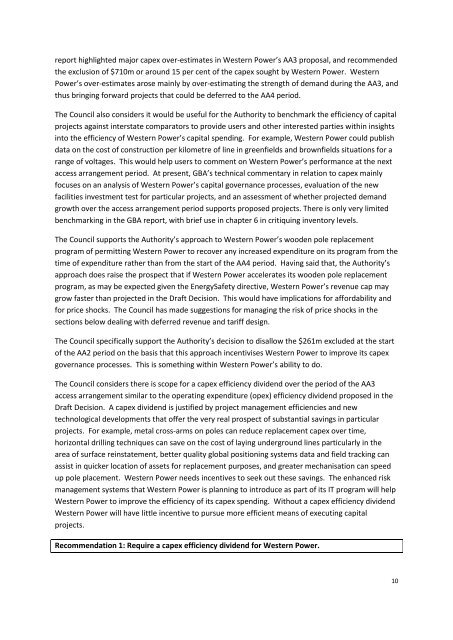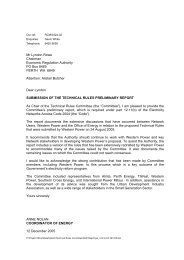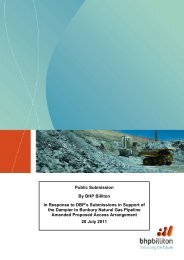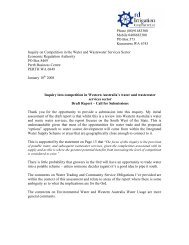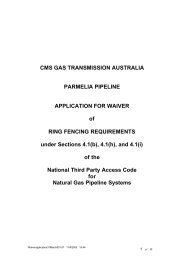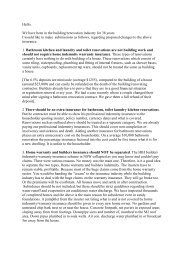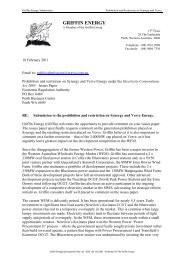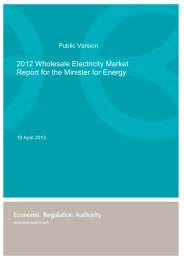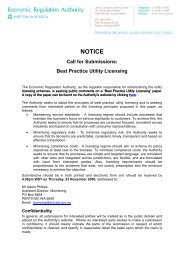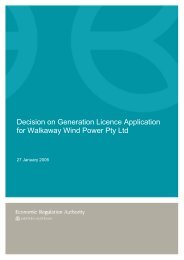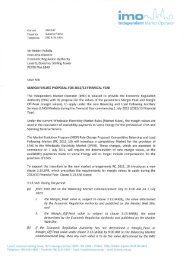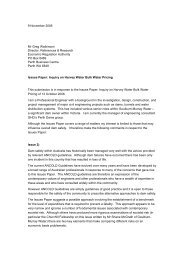Western Power Network Pricing - ERA Economic Regulation ...
Western Power Network Pricing - ERA Economic Regulation ...
Western Power Network Pricing - ERA Economic Regulation ...
You also want an ePaper? Increase the reach of your titles
YUMPU automatically turns print PDFs into web optimized ePapers that Google loves.
eport highlighted major capex over-estimates in <strong>Western</strong> <strong>Power</strong>’s AA3 proposal, and recommended<br />
the exclusion of $710m or around 15 per cent of the capex sought by <strong>Western</strong> <strong>Power</strong>. <strong>Western</strong><br />
<strong>Power</strong>’s over-estimates arose mainly by over-estimating the strength of demand during the AA3, and<br />
thus bringing forward projects that could be deferred to the AA4 period.<br />
The Council also considers it would be useful for the Authority to benchmark the efficiency of capital<br />
projects against interstate comparators to provide users and other interested parties within insights<br />
into the efficiency of <strong>Western</strong> <strong>Power</strong>’s capital spending. For example, <strong>Western</strong> <strong>Power</strong> could publish<br />
data on the cost of construction per kilometre of line in greenfields and brownfields situations for a<br />
range of voltages. This would help users to comment on <strong>Western</strong> <strong>Power</strong>’s performance at the next<br />
access arrangement period. At present, GBA’s technical commentary in relation to capex mainly<br />
focuses on an analysis of <strong>Western</strong> <strong>Power</strong>’s capital governance processes, evaluation of the new<br />
facilities investment test for particular projects, and an assessment of whether projected demand<br />
growth over the access arrangement period supports proposed projects. There is only very limited<br />
benchmarking in the GBA report, with brief use in chapter 6 in critiquing inventory levels.<br />
The Council supports the Authority’s approach to <strong>Western</strong> <strong>Power</strong>’s wooden pole replacement<br />
program of permitting <strong>Western</strong> <strong>Power</strong> to recover any increased expenditure on its program from the<br />
time of expenditure rather than from the start of the AA4 period. Having said that, the Authority’s<br />
approach does raise the prospect that if <strong>Western</strong> <strong>Power</strong> accelerates its wooden pole replacement<br />
program, as may be expected given the EnergySafety directive, <strong>Western</strong> <strong>Power</strong>’s revenue cap may<br />
grow faster than projected in the Draft Decision. This would have implications for affordability and<br />
for price shocks. The Council has made suggestions for managing the risk of price shocks in the<br />
sections below dealing with deferred revenue and tariff design.<br />
The Council specifically support the Authority’s decision to disallow the $261m excluded at the start<br />
of the AA2 period on the basis that this approach incentivises <strong>Western</strong> <strong>Power</strong> to improve its capex<br />
governance processes. This is something within <strong>Western</strong> <strong>Power</strong>’s ability to do.<br />
The Council considers there is scope for a capex efficiency dividend over the period of the AA3<br />
access arrangement similar to the operating expenditure (opex) efficiency dividend proposed in the<br />
Draft Decision. A capex dividend is justified by project management efficiencies and new<br />
technological developments that offer the very real prospect of substantial savings in particular<br />
projects. For example, metal cross-arms on poles can reduce replacement capex over time,<br />
horizontal drilling techniques can save on the cost of laying underground lines particularly in the<br />
area of surface reinstatement, better quality global positioning systems data and field tracking can<br />
assist in quicker location of assets for replacement purposes, and greater mechanisation can speed<br />
up pole placement. <strong>Western</strong> <strong>Power</strong> needs incentives to seek out these savings. The enhanced risk<br />
management systems that <strong>Western</strong> <strong>Power</strong> is planning to introduce as part of its IT program will help<br />
<strong>Western</strong> <strong>Power</strong> to improve the efficiency of its capex spending. Without a capex efficiency dividend<br />
<strong>Western</strong> <strong>Power</strong> will have little incentive to pursue more efficient means of executing capital<br />
projects.<br />
Recommendation 1: Require a capex efficiency dividend for <strong>Western</strong> <strong>Power</strong>.<br />
10


